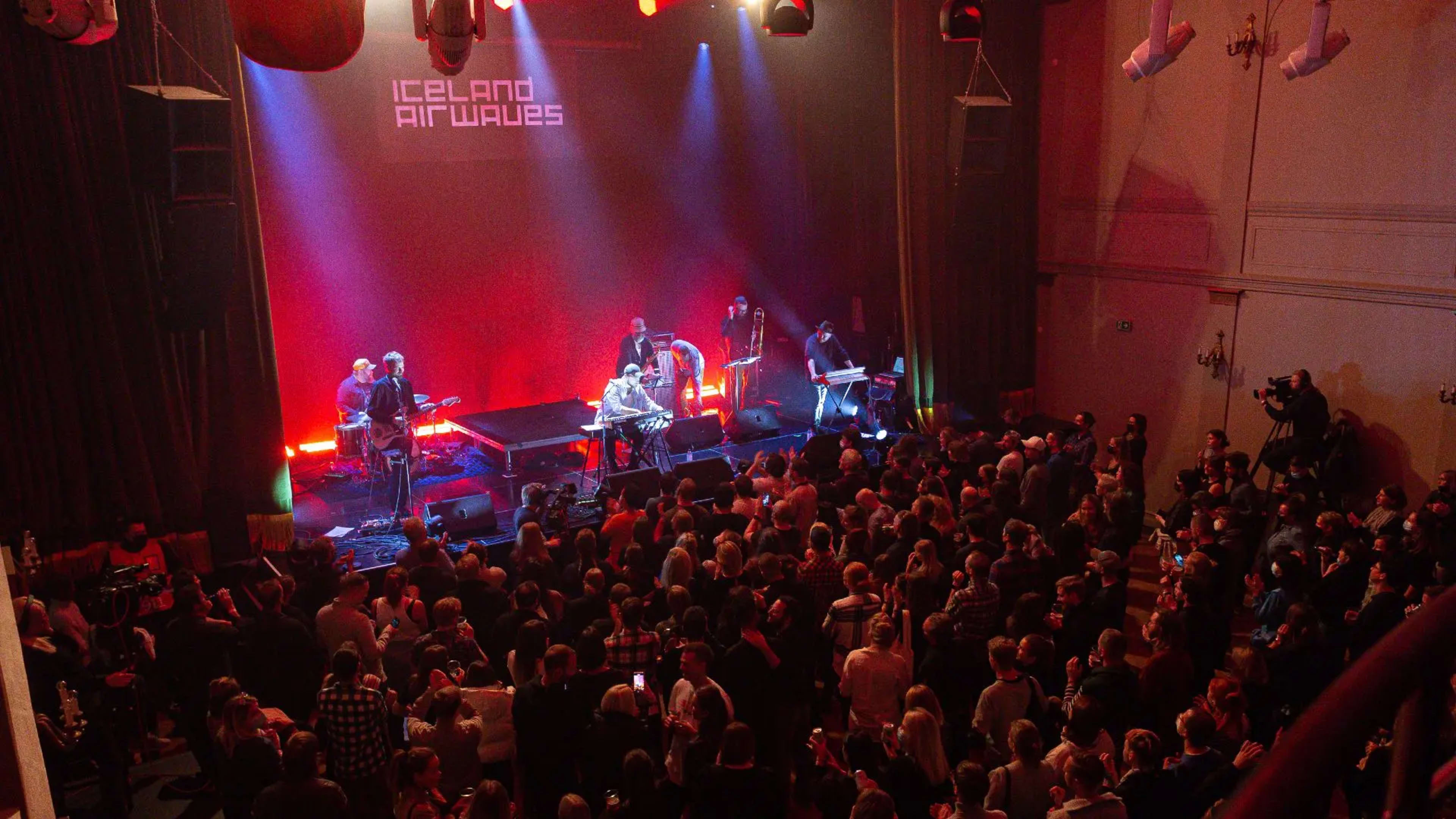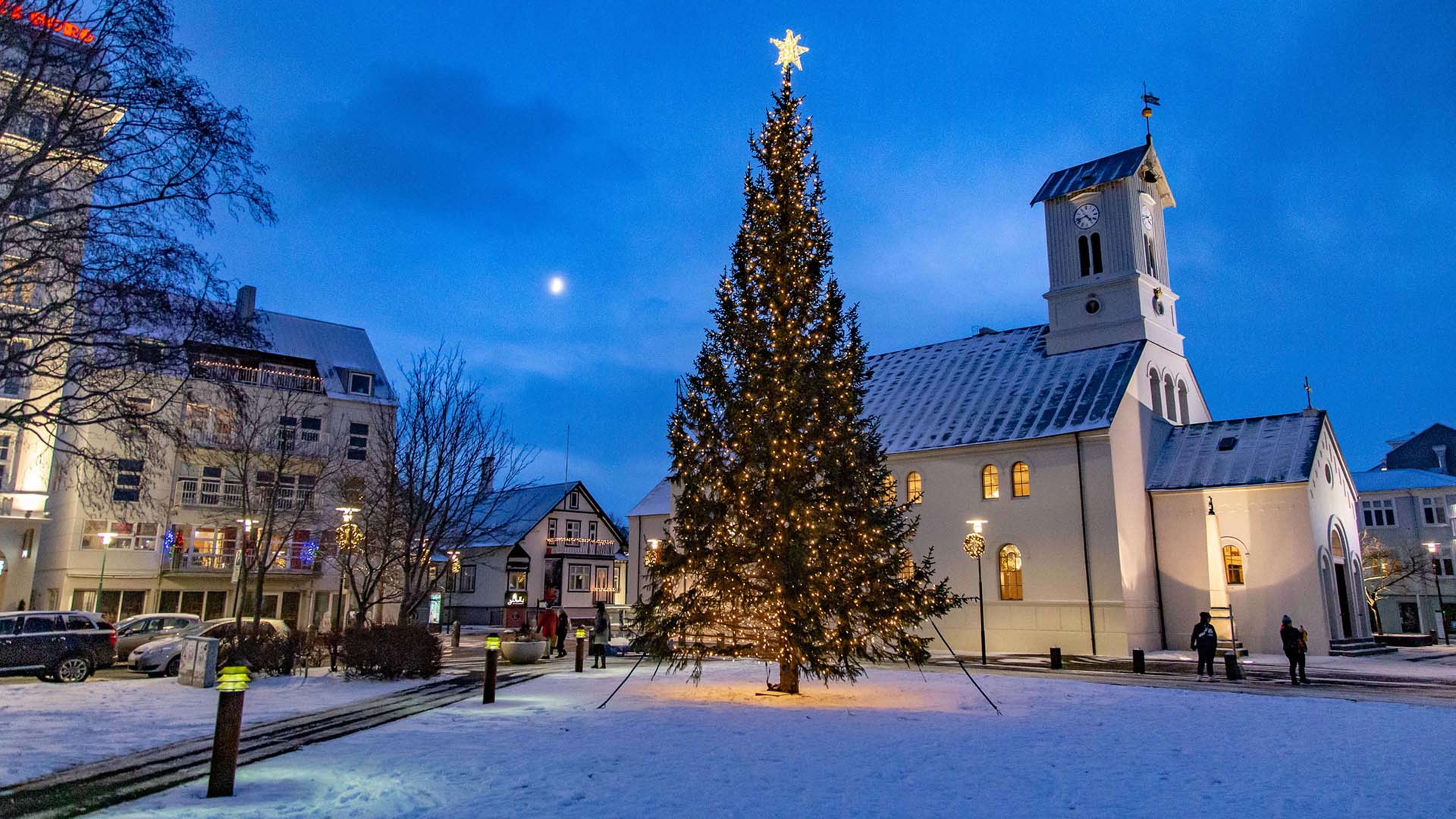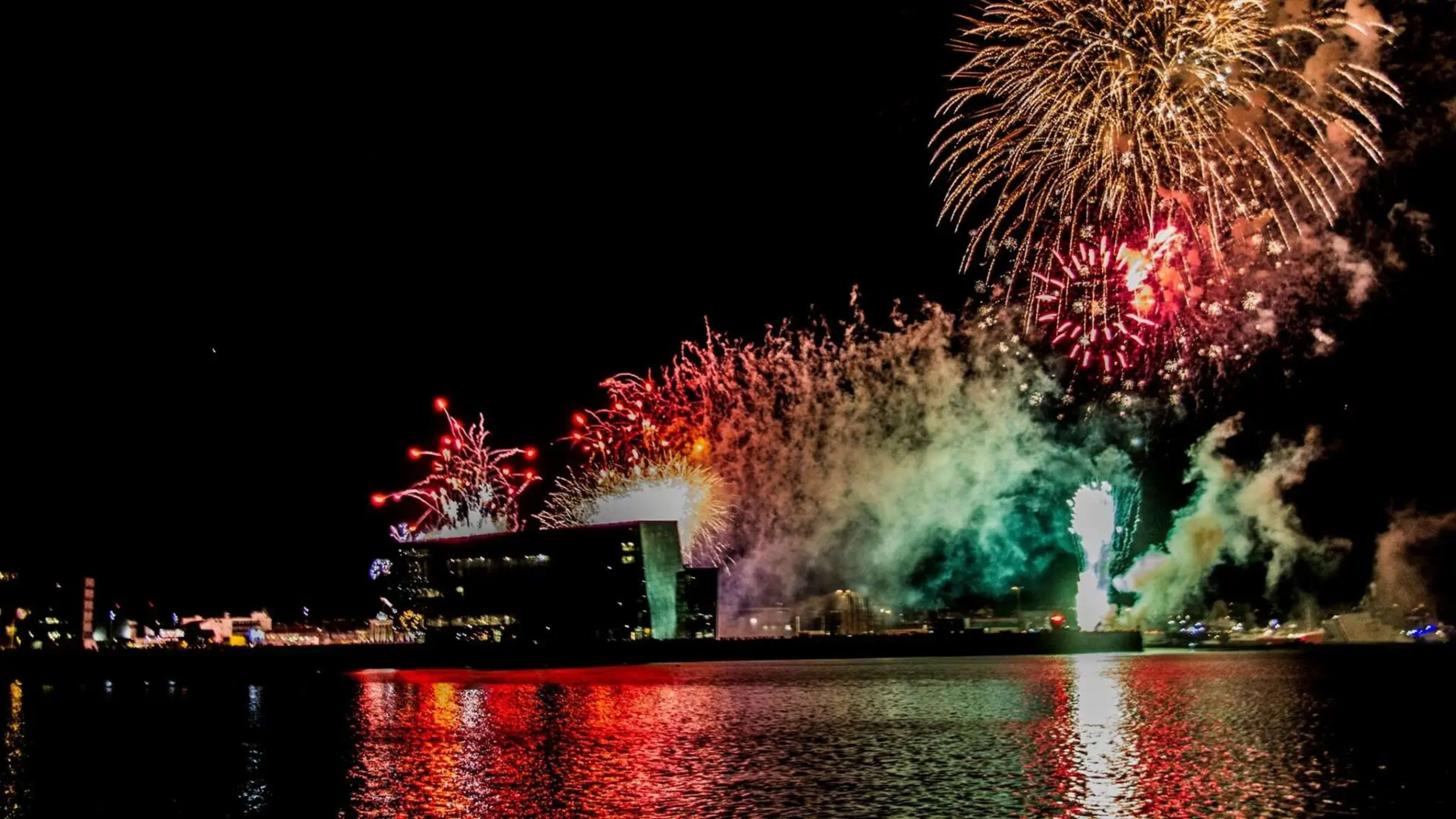January–March
Þorrablót Viking Celebration
When? End of January to early February
What is it? Held during Þorri, the first month of the Viking pagan calendar, Þorrablót is a modern festival that celebrates ancient Icelandic culture. This joy-filled event is all about singing, dancing, eating, and drinking.

Traditional poems are recited and songs sung, but perhaps the highlight of Þorrablót is the traditional Icelandic food. These include ‘delicacies’ like:
- Kæstur hákarl – fermented shark with a strong ammonia-like smell
- Svið – singed sheep’s head, served with the eye
- Hrútspungar – pressed ram’s testicles
- Blóðmör – black pudding
- Lifrarpylsa – a liver sausage containing lamb
- Harðfiskur – air-dried cod or haddock, served with butter
- Hangikjöt – slices of smoked lamb
Once you’ve lined your stomach with these treats, you can wash it all down with a healthy shot of brennivín, Icelandic schnapps!
- Don’t fancy fermented shark? Find out about the more palatable side of Icelandic food culture.
If you’re feeling brave and want to sample these traditional foods, look out for Þorrablót buffets at local restaurants.
April–June
Reykjavík Arts Festival
When? First 2 weeks of June
What is it? Since 1970, Reykjavík Arts Festival has been Iceland’s foremost cultural festival. It combines the best in local and international theater, dance, music, and the visual arts. The schedule is packed with exhibitions, concerts, opera performances, dance shows, and theater.

Although the festival is focused on Iceland’s homegrown culture scene, international artists and performers also come along for the ride.
Sjómannadagurinn (Festival of the Sea)
When? First weekend of June
What is it? Sjómannadagurinn means ‘Fishermen’s Day’ and is sometimes called ’the Festival of the Sea’. This holiday celebrates the importance of fishing in Icelandic society, still a mainstay of the economy in many smaller villages.
On this weekend, all boats and fishing vessels stay in port. Along Laugavegur, Reykjavík’s main street, free fish soup is given out and accordion players perform sea shanties. There’s also a rowing contest. If you’re into your fish, this is the festival for you!
Hafnarfjörður Viking Festival
When? Second weekend of June
What is it? This 4-day event is the ultimate way to experience Viking culture in modern-day Iceland. It takes place in Hafnarfjörður, one of Reykjavík’s neighboring towns. The focus of the event is the Viking market, where you can buy silver jewelry, drinking horns, and even swords (good luck getting one in your hand luggage)!
Of course, there’s also plenty of food and drink, including roast lamb. So you can nibble and sip on Viking delicacies as you watch Viking enthusiasts play-fight, learn how the Vikings lived, and listen to ancient tales.
Icelandic Independence Day
When? 17 June
What is it? This is Iceland’s national day and has been celebrated since the country became independent from Denmark in 1944. On this day in 1811, independence fighter and national hero Jón Sigurðsson was born. A statue of him decorates the middle of Austurvöllur square in Reykjavík city center.

It’s here that you’ll also find the Alþingi, Iceland’s parliament. On 17 June, there are performances and speeches outside the Alþingi. The Fjallkona, or ‘Mountain Woman’, also makes an appearance. She is the embodiment of the Icelandic nation and is played by a different woman every year, but always wearing the Icelandic national dress.
July–September
Verslunarmannahelgi (Merchants’ Weekend)
When? First weekend of August
What is it? Verslunarmannahelgi, literally ’Merchants’ Weekend’, is a major public holiday in Iceland. Locals head out to the countryside for camping trips and festivals, including the famous Þjóðhátíð music festival in the Westman Islands.
There’s bound to be something happening this weekend whichever part of the country you’re in. Check local listings like the Reykjavík Grapevine if you’re planning to visit at this time of year.
Reykjavík Pride
When? Start of August
What is it? This camp and colorful event brings the LGBT+ community (and pretty much everyone else) together on Laugavegur, Reykjavík’s main street. Although Iceland is LGBT-friendly at all times of year, this is a moment many people take to raise awareness, celebrate hard-won rights, and just have fun!
Attitudes to LGBT people are very laid back, so it’s not unusual for families and kids to attend Reykjavík Pride. The main focus is the parade, but over the course of a few days, there are events all over town, including gigs and film screenings.
Fun fact: In 2009, Iceland became the first country to elect an openly gay head of government, Jóhanna Sigurðardóttir. She was also Iceland’s first female prime minister.
- Check out this complete guide to LGBTQ+ travel in Iceland.
Menningarnótt (Culture Night)
When? Middle to end of August, on a Saturday
What is it? Menningarnótt, or Culture Night, has become a firm fixture of the social calendar in Iceland. Each year, thousands of people enjoy all sorts of events, shows, and exhibitions around Reykjavík.
The main hub of the event is a live music stage set up in the city center, normally at the foot of the Arnarhóll hill. The hillside makes a great natural amphitheater.

Reykjavík Jazz Festival
When? End of August or early September
What is it? The Reykjavík Jazz Festival features a broad line-up of jazz artists from all over the world, as well as Iceland’s leading jazz musicians.
Reykjavík International Film Festival (RIFF)
When? End of September to early October
What is it? Every year since 2004, the Reykjavík International Film Festival (RIFF) has been taking over the city’s cinemas with screenings of the best independent films from around the world. That said, it’s films from Icelandic directors big and small that take center stage.
Fun fact: Iceland’s film industry has grown massively in recent years. You might recognize its landscapes as a backdrop to Hollywood blockbusters like Die Another Day, Prometheus, The Secret Life of Walter Mitty, and Interstellar.
October–December
Iceland Airwaves
When? End of October or early November
What is it? Iceland Airwaves is the jewel in the crown of music festivals in Iceland. Started in 1999, Airwaves brings together the hottest acts on the Icelandic music scene, along with international names.

Airwaves is known for its spread-out format. Gigs take place at venues across Reykjavík, with the Harpa concert hall attracting the biggest crowds. It’s easy to wander from one venue to the next and drop in on something different.
And there are plenty of off-venue gigs if you missed your favorite artist. This means it’s hard not to go to Airwaves if you’re at a bar in Reykjavík at this time of year!
- Get the lowdown on the Icelandic music scene.
Christmas
When? 24–26 December (with festivities starting in November)
What is it? In November, Icelanders start decking their homes and streets in Christmas lights and decorations. As you wander Reykjavík’s old town soaking up the atmosphere, it’s hard not to let the festive spirit rub off on you.
A custom many Icelanders take part in at this time of year is the Christmas buffet. They’re offered by local restaurants and are definitely a classy affair. Traditional Icelandic dishes served at Christmas buffets include hangikjöt (smoked lamb served with potatoes, vegetables, and white sauce), rjúpa (Icelandic ptarmigan), and reindeer.

On the first Sunday of Advent, head down to Austurvöllur square in Reykjavík city center (above) to watch the Christmas tree lights being switched on. This is something of an event: there’s music, carol singing, and a visit from the 13 Jólasveinar (Icelandic Yule Lads). They’re known for their mischievous nature and have names like Þvörusleikir ‘Spoon-Licker’, Pottaskefill ‘Pot-Scraper’, and Hurðaskellir ’Door Slammer’.
- Experience the holiday for yourself on one of these Christmas trips to Iceland.
- Learn more about the Yule Lads with this guide to Iceland Christmas traditions.
Christmas, or jól in Icelandic, is the most important celebration of the year for many Icelanders. Families, friends, and coworkers come together and hold Christmas parties, bake cookies, drink jólaglögg (mulled wine), and decorate their homes.
The main day of celebration for Icelanders is Christmas Eve (24 December). This is when the gifts are given!
New Year’s
When? 31 December–1 January
What is it? After the coziness and togetherness of Christmas, Icelanders love to get in the party mood for New Year’s. The festivities start with a formal dinner. Then friends and family gather at bonfires, known as brennur, in their local neighborhood. This is a tradition you can most definitely take part in.

Later on, it’s time to head back home for a few drinks before watching the fireworks. There are displays all over the country, but by far the biggest is the firework show by the harbor in Reykjavík. At midnight on New Year’s Eve, there’s nowhere else you should be!
- Join in on the festivities with one of these Iceland New Year’s packages.
Things to see and do in Iceland by month
Want to learn more about what there is to see and do in Iceland throughout the year? Or just get an idea of when is best to visit? Check out our month-by-month guides below.
